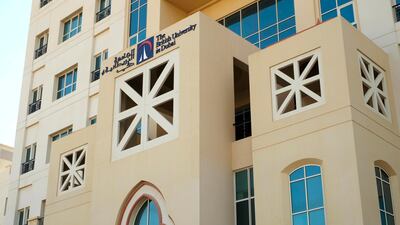A Dubai university that was left £3 million ($4.14m) by a British naval officer to create a professorship won its court case against a UK academic who produced an invalid will claiming he was the beneficiary.
Prof Robert Whalley, a former military commander, worked at the British University in Dubai for 10 years in the faculty of engineering and IT.
In 2012, he handed BUID's vice-chancellor Prof Abdullah Alshamsi an envelope containing a copy of his will leaving 90 per cent of his fortune to the university to fund an endowed professorship in his field of study, London's high court heard.
But after Prof Whalley died from cancer in 2018, British academic Prof Kambiz Ebrahimi produced a second will claiming that he and his wife were the beneficiaries of the entire fortune.
The court heard that Dr Antonios Pezouvanis and Dr Panagiotis Athanasiou, of Loughborough University, who had worked for Professor Ebrahimi, made false statements regarding the witnessing and signing of the 2018 will.
Judge Davis-White QC is referring the case for a criminal investigation.
“Possible criminal actions that may have taken place in this case include perjury, conspiracy to defraud and conspiracy to pervert the course of justice,” he said.
“Given the facts of this case, I consider that I should refer the papers on to the Director of Public Prosecutions and direct that he should be provided with a copy of this judgment and copies of the written evidence from Prof Ebrahimi and each of the two Loughborough witnesses as lodged in these proceedings.”
Prof Whalley, who lived in the Yorkshire town of Ilkley, was head of mechanical engineering at Bradford University, where Prof Ebrahimi was his research assistant.
He took up the post in Dubai after his son died in a motorcycle accident in Ilkley and his wife died after suffering from dementia.
On moving to Dubai, he worked with Prof Alaa Ameer on gas and oil pipeline projects and in his will left 5 per cent of his estate to Prof Ameer, 5 per cent to Prof Ebrahimi and 90 per cent to BUiD.
Following cancer treatment in Dubai, he returned to the UK in 2017 to take up a post at Loughborough University, where he worked with Prof Ebrahimi, Dr Pezouvanis and Dr Athanasiou until his death in 2018.
The court heard of the existence of a 2018 will, in which his entire estate was left to Prof Ebrahimi. Two people in Ilkley witnessed it separately on May 4, 2018, making it invalid.
However, on the reverse of the will were the signatures of Dr Pezouvanis and Dr Athanasiou, who claimed to have travelled to Ilkley to sign the document.
“The claimant's case was (and is) simple: the Loughborough witnesses did not attest the signature of Prof Whalley as they say,” the judge said.
“They have simply added their signatures to the document later, after Prof Whalley's death, and at the behest of the defendant when it subsequently came to light that the 2018 will was otherwise invalid.
“I find that the relationship between Prof Ebrahimi and each of the Loughborough witnesses goes a long way to explaining why they would have agreed to lie about the alleged meeting on May 3, 2018, as they did in their affidavits of due execution and their witness statements in the proceedings before me."
The judge said the Loughborough witnesses “may well have supported the dishonest case of Prof Ebrahimi” because of “a sense of indebtedness” and because of “his long position of authority over them”.
A bank statement from one of the witnesses showed he had purchased cinema tickets in Loughborough at the time he claimed to have been in Ilkley – 160 kilometres away.
“Leaving aside the issue of to two sets of witnesses, it was wholly unclear why the Loughborough witnesses would not have been asked to sign and set out their details on the bottom of the first page as the Ilkley witnesses were asked to do (and did do) the following day,” the judge said.
“The most natural thing (as in the case of the 2012 will) would be to have the word ‘witnessed’ and the relevant witness details placed immediately under the signature of the testator, rather than being freestanding and with no explanation on the reverse of the document.
“For all these reasons and in all the circumstances, I am satisfied that the defendant's case was a false one, supported by the false evidence of the two Loughborough witnesses, and that the 2018 will is invalid.”


